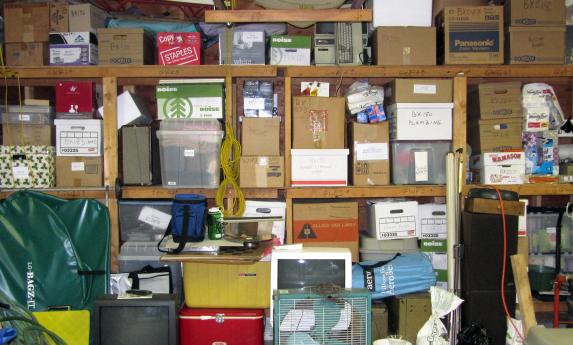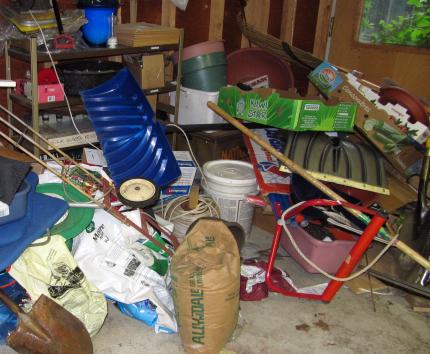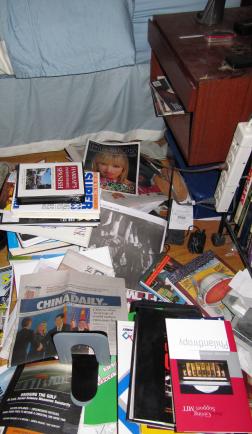
This may go back to a lesson I failed to learn back in elementary school, specifically in our "shop" classes. We had to stop work on whatever project we were busy with ten minutes before the end of each class. The final ten minutes were reserved for "cleanup", in which we put all our tools back in their storage locations, and cleaned up our work areas. I remember wondering at the time why we had to do this. After all, we were going to continue our work, often the very next day. Why not just leave everything in place, spread out in our work areas, so we could resume where we had left off? Of course, if someone else was going to use the space in between our own usage, then the cleanup made sense. But I concluded that if I was to be the only user of the space, cleaning up was not necessary until the end of the project. This conclusion, I've since realized, was simply wrong. I can't tell you how many projects I've started with the intent of finishing them the next day, which were then delayed, or even never finished. Meanwhile, I often can't find the tools I need for other projects, because they're not where they belong. The accumulation of piles of stuff may be related to a tendency to procrastination. Often I intend to clean up after a project, or to find a spot for a newly purchased item and stow it there, or to determine the disposition of some piece of paper, or to read a newly purchased book. But I postpone the intended action, and the physical artifacts involved just lie around in heaps. Books are a major component of some of my piles. I find it hard to throw out a book. I tend to remember things I've read, and I want to be able to go back to the book to get an exact citation (particularly now that I'm writing a blog). But books are bulky and heavy, and we don't have enough shelves to store them all. I once read a book on straightening up your house, which described how to tell if you have too many books. It said that if you have one more book than you have space for on your bookshelves, you have too many. I can't find the book this is in to give you an accurate citation. I've been making some headway on the books, which involves being willing to actually get rid of them. Over the past couples of years, I've donated fifty or so boxes of books to More than Words, a bookstore and coffee house in Waltham, Massachusetts that teaches "... youth who are in the foster care system, court involved, homeless, or out of school to take charge of their lives by taking charge of a business." I'm sure there will be more book donations in the future. But there are even more books that I couldn't bear to part with. Many (but not all) are indexed in files in my computer, so I can find them in the boxes in which they're stored. Which brings me to another issue - the use of computers for indexing. The good news is that without computer indexing, I couldn't keep track of so much stuff. The bad news is that with computer indexing, I can keep track of so much stuff. My first foray into indexing my possessions was back in college in the sixties, long before personal computers, when I kept track of where things were stored in my dormitory room using a box of index cards. These were so-called "three by five" index cards, three inches high by five inches wide (7.62 cm X 12.70 cm). I was tempted to call this box here what I called it back then, a "card file". But "file" already has too many meanings these days - the word "file" could refer to a cabinet full of file drawers, a single Pendaflex folder hanging in one of those drawers, or a file in a computer. Among the possible storage places in my dorm room were piles of junk in various corners, and things in those piles were often indexed on the index cards. That is, there might be a card reading "Calculus book - G. B. Thomas" on the top line, and below, "Pile A". If I forgot where I put the book, I looked it up in the card file, and then rummaged through Pile A until it turned up. I still use this system today, but the indexes are files on my computer instead of in an index card box. For instance, one of these computer files is called "storage.txt", and it indexes the bulk of the items I have stowed away. It currently contains over 1,100 indexed items, one per line. That doesn't include books, which are indexed in a separate file, called "Books.txt", indexing over 600 books (and that's after having given away well over fifty boxes). Another index can be used to locate my hanging file folders, located in six file cabinets, most with four drawers each. The location of the stuff that's stored is abbreviated in these files, and another text file called "where.txt" contains an alphabetized list of the abbreviations, and gives their actual physical location. Some of the stuff indexed in storage.txt is stowed in my garage. The picture below shows the shelves along the back wall.  The shelves have names - GWxy, where x is a letter representing a position left to right, and y is a number giving the level. Thus GWC2 is the third position from the left, on the second shelf from the bottom ("GW" stands for "Garage West"). The boxes have numbers, such as BX031, or BXP03 (a plastic box). But by using up so much wall space, I have limited space left to hang things like shovels and rakes, resulting in a pile in the corner of the garage, shown further below (the contents of that pile is not indexed). Note 1  Is this good? Probably not. I probably should have thrown away most of this stuff years ago. I might start to sound like a classic hoarder, but in fact I'm nowhere near as pathological as most of the people featured on recent television "reality" shows on hoarding. I've got everything more or less under control. The piles are limited in scope, and one can still walk around the house freely. Still, I'd like to clean it up before my children have to do it. And this will take a change in attitude - "When in doubt, throw it out." Up until now, I wanted to keep (and index) everything, just in case I might need it some day. If I start throwing things away, OK, now and again, I'll throw something out and then need it the very next week. Too bad, but I can afford it. I have a fairly large collection of old integrated circuits and other electronic components that I salvaged over the years from companies I worked at, where they were being discarded for one reason or another (fortunately, these don't take up very much space). The one time I built a substantial electronics project from scratch, I was able to use only a few dozen of these components, mostly wire-wrap IC sockets. Everything else I had to buy. My laboriously amassed component collection saved me about two percent of the project cost, if that. It's possible that my tendencies are to some extent inherited. I've already written, in an earlier blog entry called Dan and the moon, about my father endlessly repairing a toilet in our guest bathroom, and about how when my father died, one of the first things my mother did was to call in a plumber to replace the whole thing. Similarly, I've previously described a wonderful gift my daughter Sara gave me, entitled Things I worry about, with the sub-title, "Top ten clues that I'm turning into my Dad". One of the notes in this framed collage reads, "I have piles all over my room, especially next to my BED". Another note reads, "I make up complicated systems to solve simple problems". Sound familiar? A New Yorker cartoon by Eric Lewis that made an impression on me shows a man apparently lying on his death bed, with his wife at his side. With what might be his final breath, he says to her, "I should have bought more crap." Note 2 Kind of makes you think. Margie and I spent our honeymoon at the Club Med in Martinique, as described in my blog entry Allons enfants de la patrie. Upon our return, she looked over my apartment for a second, and then said, "Oh no, he's a slob". She'd previously spent quite a bit of time there - had she not noticed this before? Maybe love really is blind. Can I get rid of all this stuff? I hate to just discard things that I could sell on eBay, even if only for a little bit of cash. But is the effort I'd put into running the auctions and shipping the items worth what I'm sure would be a relatively small return? Is it worth my while to put in hours of effort for a few hundred dollars? Perhaps the issue is more that I hate to discard something if I think that someone else might be able to use it. I've had some success with Freecycle, but that also takes an effort - photographing the items, writing and posting the offer, arranging for a pickup, and so on. If I'm going to go to all that trouble, why not earn a little money? Perhaps I should put an entry in my calendar, and check back on the anniversary of this blog entry, to see if the piles are any smaller. I just need to chip away at the stuff as time allows. I'll get started as soon as I can develop a good system.
  Note 1: A close inspection of this pile would reveal quite a few snow shovels. I've got small ones for densely packed snow, more than one classic "back-saver" with a jog in the handle, and wide pushers for light shallow snow. In New England, you need more than one snow shovel. [return to text] Note 2:
I can't reproduce this copyrighted cartoon here, but you can see it online in the Condé Nast store (you can click on it to enlarge it, and you can even buy a copy). [return to text]
 |
 I have piles of stuff all over my house, particularly next to my bed. I'm trying to do something about this, but it's going to be a major project. I hope I can finish it before I die.
I have piles of stuff all over my house, particularly next to my bed. I'm trying to do something about this, but it's going to be a major project. I hope I can finish it before I die.